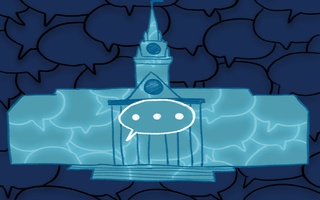The price of free speech is in some cases literal. For the campus speaking engagement and visit of controversial political scientist Charles A. Murray ’65 on September 6, the University spent $12,000 on security from the Cambridge Police Department. Neither is this an isolated incident: Controversial ex-pharmaceutical executive Martin Shkreli and Secretary of Education Betsy DeVos were also met with rampant student protests and security bills that Harvard has not disclosed.
In an ideal situation, an individual’s opinions would not put them or audiences interested in hearing them at risk. But as recent events at the University of California Berkeley and Middlebury College have shown, this is not always a guarantee on college campuses. We acknowledge and appreciate that Harvard is too invested in both its student body and its public image to let either controversial speakers or event safety to be compromised.
The invitation of controversial speakers to college campuses has sparked student protests across the country, some of which have turned violent. Six protests, including the shooting of a protester, haunted just the first four months of 2017. The possibility of violence makes security necessary at campus protest events. And Harvard has been right to live up to this obligation.
Dual concerns for the student body and public image also drive the University to continue holding such controversial and costly events. In an era of increasingly polarized politics, even inviting the Secretary of Education to speak has become a controversial move. Debates on the limits on free speech have therefore run rampant across the country and Harvard has been forced to participate. As an Editorial Board, we recognize that Harvard hopes for its students and its reputation to continue inviting controversial speakers.
As Harvard moves forward, we hope the fractures in our society will begin to heal. But as long as speaking events remain controversial, Harvard will have to spend its money on security.
This staff editorial solely represents the majority view of The Crimson Editorial Board. It is the product of discussions at regular Editorial Board meetings. In order to ensure the impartiality of our journalism, Crimson editors who choose to opine and vote at these meetings are not involved in the reporting of articles on similar topics.
Read more in Opinion
In Defense of Thoughts and PrayersRecommended Articles
-
Paulin’s Absence Denies Our Chance To DecideTo the editors: In the current controversy about English poet Paulin’s controversial views and his right to speak here (
-
Communication.We invite all members of the University to contribute to this column, but we are not responsible for the sentiments
-
WILL FORM LEAGUE FOR DEFENCEA National Security League of the University will hold its first meeting in the Trophy Room of the Union tomorrow
-
 Free Speech, Not Free Rein
Free Speech, Not Free Rein -
 At Harvard, Free Speech Likely Costs Thousands
At Harvard, Free Speech Likely Costs Thousands













